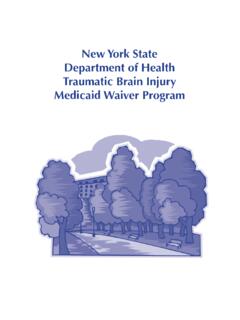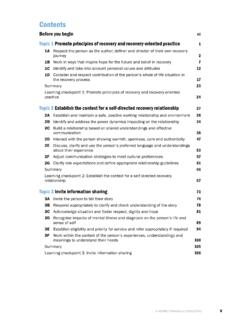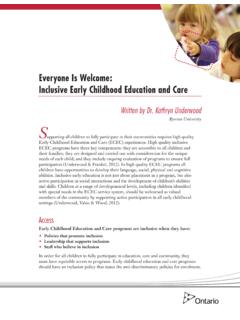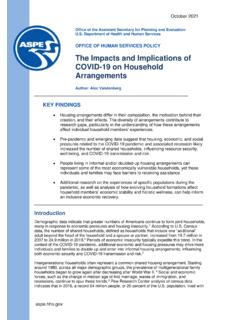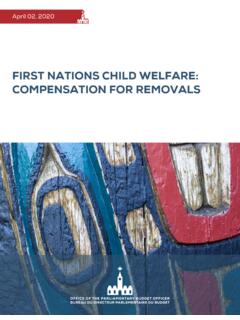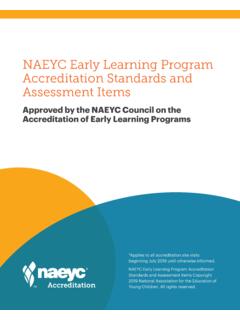Transcription of Carer Checklist - Carers Australia
1 Carer Checklist NDIS planning support resource Carer Checklist . TO PREPARE FOR THE NATIONAL DISABILITY. INSURANCE SCHEME ASSESSMENT & PLANNING. MEETINGS. PURPOSE OF THE Checklist . This Checklist is designed to assist Carers to describe the support they provide to contribute to the National Disability Insurance Scheme (NDIS*) planning process. It is not a compulsory part of the NDIS planning process and you do not have to complete it. It may be of use to you in the preparing for your participation in planning sessions or in talking to the NDIS about your role. *Words and acronyms in bold are explained at the end of this document. BACKGROUND. Under the NDIS people with disability will be assessed for their eligibility to receive an individual funded package of support .
2 If they are deemed eligible, each participant will have a meeting with the National Disability Insurance Agency (NDIA) to develop their individual plan. This plan outlines the supports that will be funded by the NDIS and is tailored to their goals, personal circumstances and disability support needs. WHO IS THIS Checklist FOR? This Checklist is for people who provide unpaid care and support to a family member or friend with a disability who is a participant in the NDIS or who is eligible to be a participant. Carer Checklist 2. HOW TO USE THIS. Checklist . Filling out the Checklist will assist Carers to think about and describe the supports they provide to a person with a disability.
3 It is common for Carers to feel confused, nervous and maybe even a bit overwhelmed by how to help the person they care for to access and prepare for the NDIS. This is normal, and it is important to remember that the NDIA staff are there to help you and the person you care for to achieve a positive outcome. How Carers are involved in NDIS assessment, planning and review processes will vary according to individual participants' circumstances. For example, Carers might go along to the planning meeting with the participant, be listed in the participant's plan as an informal support and/or help the participant to access funded services and supports. It is important for the NDIA to understand what your caring role involves so that the support package allocated to the person you care for meets their needs and supports your ongoing caring role.
4 Important information may include what you do as a Carer , how often you do these tasks and how caring is affecting you and other family members. You will also need to tell the NDIA if you want to keep providing the same level of care, or if you need extra help and support to keep providing care. The questions on the following pages are a prompt to help you think about what you will need to tell the NDIA. For those who care for someone with an episodic (on and off). condition or disability, you may need to explain how your caring role changes when the care recipient is relatively well' versus when they are unwell. Please remember, this is not a complete list and there may be other issues you need to discuss with the NDIA which are not mentioned here.
5 A useful question to ask yourself may be; If I was away or unable to care for a week, what would I need to tell the person who took over my caring role? . Carer Checklist 3. THE CARING CONTEXT. Think about the context of your caring role and how this affects you. LIVING ARRANGEMENTS. Does the person you care for live with you? (either permanently or occasionally) Yes No Would you or the person you care for prefer to change this arrangement? Yes No If the person you care for lives elsewhere, are you responsible for ensuring they have affordable, safe, secure and suitable accommodation? Yes No Are you financially responsible for accommodation? Yes No Are you financially responsible for maintaining the accommodation/property?
6 Yes No Does it take you a long time to travel to where the person you care for lives? Yes No If yes, how long and by what transport? Can the current arrangements continue in the short to medium term? Yes No If no, why? other comments: Carer Checklist 4. THE CARING CONTEXT. ADDITIONAL CARING RESPONSIBILITIES. Do you care for more than one person with a disability or illness? Do you care for other family members who are unable to fully care for themselves? ( children - either your own or the children of the person you care for). Do you think your family circumstances may change in the near future and you may take on additional caring duties ( for ageing parents)? If yes, will this affect the current level of care you provide?
7 Comments: other SUPPORTS. Does anyone else also undertake caring responsibilities for the person? How do they help? Comments: CULTURE AND RELIGION. Are you able to access culturally appropriate services and supports? For example services that translate into your preferred language and where you can express your religious practices or aspects of your culture without judgement. Comments: Carer Checklist 5. THE CARING ROLE. Think about what you do on a daily or weekly basis as well as things you do less frequently. How many hours would you spend each week or month assisting, supervising or prompting (that is, encouraging or reminding) the person you care for? PERSONAL CARE. Do you assist the person you care for with personal care?
8 For example: Bathing Grooming Ordering & obtaining supplies Dressing Assistance using the toilet Cleaning teeth Changing continence aids TASKS TIME SPENT HOW OFTEN. Carer Checklist 6. MOBILITY. Do you assist the person you care for with mobility? For example: Ensuring the person you care for does not fall Assistance with moving around the house Helping the person you care for to hold and manage objects Helping the person you care for to sit up Turning the person you care for over during the night TASKS TIME SPENT HOW OFTEN. MEAL PREPARATION, EATING & DRINKING. Do you assist the person you care for with meal preparation, eating & drinking? For example: Preparing food Spoon feeding ensuring the person you care for doesn't choke while eating Keeping check on unhealthy eating habits Assistance with tube feeding TASKS TIME SPENT HOW OFTEN.
9 THE CARING ROLE Carer Checklist 7. SAFETY. Do you assist the person you care for to be safe? For example: Dealing with problematic alcohol or drug use Ensuring the environment is safe from trip hazards Ensuring the person you care for does not wander off Checking water temperature Preventing the person you care for from hurting themselves or others TASKS TIME SPENT HOW OFTEN. DOMESTIC LIFE. Do you assist the person you care for with domestic activities? For example: Helping the person you care for with managing finances Washing their clothes support and encouragement in cleaning their house Helping to care for their pets Paying rent and bills Helping the person you care for shop for groceries Encouraging and helping the person you care for to get up in the morning and to keep healthy sleeping patterns TASKS TIME SPENT HOW OFTEN.
10 THE CARING ROLE Carer Checklist 8. PROVIDING EMOTIONAL support . & BEHAVIOUR MANAGEMENT. Do you assist the person you care for with behaviour management? For example: Helping the person you care for manage symptoms of mental illness (such as anxiety or hearing voices). Reassuring and calming the person you care for if they're distressed Providing support through events the person is worried or concerned about Assisting with managing the person's environment to avoid triggers for stress Supported decision making Assisting and providing suggestions on positive ways of responding to challenges and stresses Managing behaviours Motivating and assisting to reframe thoughts in a positive manner Encouraging or providing assistance with planning and problem solving TASKS TIME SPENT HOW OFTEN.


